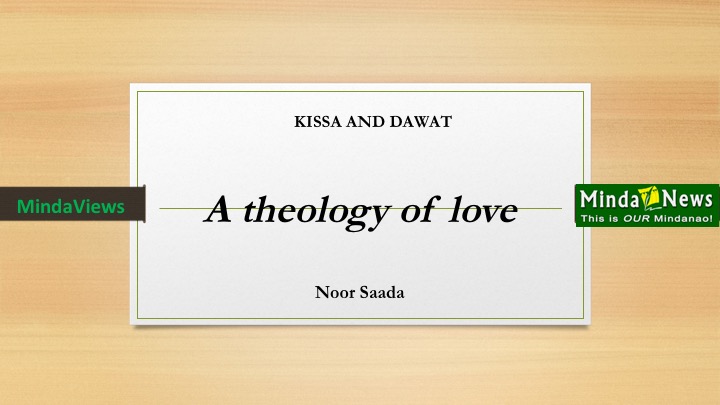 ZAMBOANGA CITY (MindaNews / 7 July) – In a world where mainsteam narrratives about Islam are very skewed towards violence, it is hard for a reader to accept nor imagine that it can be a theology of love. Nonetheless, let me share why Islam for the overwhelmingly 1.6 billion souls on earth is a source of love and not of hate, of altruism higher than selfishness and parochial interest. Let me dip into the same scripture from whence violent extremists take motivation and influence and leave it to the readers to judge afterwards.
ZAMBOANGA CITY (MindaNews / 7 July) – In a world where mainsteam narrratives about Islam are very skewed towards violence, it is hard for a reader to accept nor imagine that it can be a theology of love. Nonetheless, let me share why Islam for the overwhelmingly 1.6 billion souls on earth is a source of love and not of hate, of altruism higher than selfishness and parochial interest. Let me dip into the same scripture from whence violent extremists take motivation and influence and leave it to the readers to judge afterwards.
Etymological roots
When we talk about Islam, there is no higher authority than the Qur’an and the Sunnah (Practice, model) of the Prophet Muhammad (pbuh[1]) and these books are written in Arabic. Let us then explore the meaning of love in the original language of the Qur’an.
The root word of love in Arabic is [h] [b] [b] and “hubb” is its noun and “yuhibbu” is its verb, meaning to love. When the preposition “li” is prefix to the root word, it means “in the love”. When the preposition “ka” is prefix to the root word, it means “as [they should] love”. These are examples of associative words that can be found in the Qur’an.
Love in the Qur’an
Love and belief in God. Love in both noun and verb forms appear in the Qur’an around forty times. Let us explore love from cover to cover. It first appears in Surah (Chapter) 2: Al Baqarah in Ayah (Verse) 165 describing two types of people: The first type of people equates their love for God with idols. In Tafsir Ibn Kathir, this is polytheism (shirk), appointing an equal to God and is considered greatest sin. The second type of people are those who believe in the oneness of God (monotheism) and their love for God is stronger (ashaddu). Thus love here is associated with belief – the first one describing a wrong type of love and the second a right way of love as pertains to the Divine. This is consistent with one of the divine attributes, Allah is Al-Wadood, The Loving.
Love and selflessness. In Verse 177 of the same chapter 2, love is used to describe an instance of selflessness, when people give of their wealth as a form of righteousness and obedience to God. This selflessness is also descibed in Verse 8 of Chapter 76, helping the poor and the needy despite of their need for it.
Love and good deeds. In Verse 195 of the same chapter 2 and in Verse 134 of Chapter 3: Ali Imran, the last line runs this way, “… Allah loves the doers of good”, thus, love is associated with good deeds. According to Tafsir Ibn Kathir, good deed is a type of ihsan or religious excellence) and charity does not decrease one’s wealth because of the multitude of its spiritual gains. This is repeated in Verse 148 of Chapter 3: Ali Imran, where the “doers of good” are rewarded both in this world and the hereafter. In Verse 93 of Chapter 3: Ali Imran, past actions of “the doers of good” is forgiven if they now submit and do good deeds.
Love and trust. In Verse 216 of the same chapter 2, there is a line, “…perhaps you love a thing and it is bad for you …”. In life, a Muslim may desire a number of things which over time may be harmful or non-beneficial, therefore, a Muslim is expected to trust and yield to the divine plan (qadr). This notion of predestination involves trusting the Divine and made succinct in Verse 159 of Chapter 3: Ali Imran, “Allah loves those who rely [upon Him}.”
Love, repentance and purification. In Verse 222 of chapter 2, the final line runs this way, “Indeed, Allah loves those who are constantly repentant and loves those who purify themselves.” The association of love with repentance is premised on the frailty of human nature and tendency to commit moral mistakes; while purification commences with repentance, recognizing one’s mistakes and making an effort to cleanse one’s self. Love of those who purify themselves is also reflected in Verse108 of Chapter 9: Al-Tawbah.
Love, desire and best return. In Verse 14 of Chapter 3: Ali Imran of the Qur’an, describes human love with the desire for spouses and to have children, accumulation of material wealth from silver and gold to horses and cattles and lands. We are reminded that these material wealth we desire or love so much are only enjoyment of worldly life, but the best return (husnul maāb) is with God. In Verse 152 of the same Chapter 3, describes how pursuing what we love or desire can lead to disobedience, consequently, defeat. In Verse 25 of Chapter 4: Al-Nisa’, warns us of secret lovers, those engaged in satisfying the needs of the flesh outside marriage and the presciption to the call of the flesh is patience or steadfastness. The warning about secret lovers is repeated in Verse 5 of Chapter 5: Al-Ma’idah, the complying with the prescriptions for moral conduct is part of faith and whoever denies one’s faith, one’s work becomes worthless and in the hereafter among the losers (khāsirīn). In Verse 30 of Chapter 12: Yusuf, love is described as passionate desire outside the fold of marriage, and is therefore contrary to Islamic law. In Verse 32 of Chapter 38: Sad, it describes how the worldly love often overpowers one’s act of remembering the Divine; and in Verse 20 of Chapter 75: Al-Qiyamah and Verse 27 of Chapter 76: A-Insan, describe human love for the immediate gains.
Love and guidance. In Verse 31 of Chapter 3, the Islamic theology is premised on the prophethood of Muhammad (pbuh) and thus those who follow him will in turn be loved and forgiven by Allah, who is both Forgiving and Merciful. Thus to love God is to love the prophet and to follow his model.
Love, commitment and fear-humility. In Verse 76 of Chapter 3, love is associated with fear-humility or surrender to God and fulfilling one’s commitment. Commitment here, in the Tafsir Ibn Kathir implies avoiding what has been explicitly prohibited and obeying hat has been ordained by God. At human to human level, such commitment can be as a consequence of employment, business contract or socialization.
Love and righteousness. In Verse 92 of Chapter 3: Ali Imran, spending from that which we love is righteousness (al-birr) and worthy of good reward, and we are reminded that whatever we spent from that which we love is known to God. God’s love for the righteous is repeated in Verses 4 and 7 of Chapter 9: Al-Tawbah.
Love and steadfastness. In Verse 146 of Chapter 3: Ali Imran, love is associated with steadfastness despite of the affliction nor weakened in their resolve. In a hadith (sayings of the Prophet Muhammad), the nature of steadfastness is explained in this manner, “They never lost heart for that which befell them in Allah’s way, nor did they weaken nor degrade themselves.”
Love and deception. In Verse 107 of Chapter 4: Al-Nisa’, God’s love is not those who are deceptive (khawwātan). There is no ifs and buts here nor excuses for treachery. In Verse 13 of Chapter 5: Al-Ma’idah, the “doers of good” are those who do not break their covenant, distort words, forget portion or engage in deceipt. In Verse 5 of the same chapter 5, it comes to us that to assume we are God’s beloved in preposterous and presumptuous of His Divine Love.
Love and justice. In Verse 42 of Chapter 5: Al-Ma’idah, love is associated with justice and if we can’t judge fairly then it is better to just turn away from the contending parties. God’s love over the just is repeated in Verse 9 of Chapter 49: Al-Hujura, Verse 8 of Chapter 60: Al-Mumtahinah,
Love and symbiosm. In Verse 54 of Chapter 5: Al-Ma’idah, there is a line describing “a people He will love and who will love Him” an ideal ratio of love; and these people characterized by their humility toward believers, powerful toward disbelievers, striving for Allah’s cause and fear or blame a critic, and this divine love is bestowed upon whom He wills.
Love is from the Divine. In Verse 39 of Chapter 20: Ta-Ha, there is a love connection between the Divine and His creation, “And I bestowed upon you love from Me that you would be brought up under My eye.” This particular line pertains to how Moises was saved from the decree of death by the Pharaoh when he was sent adrift and ended being cared for within the Pharaoh’s household. In general it tells of how love can save a soul.
Closing statement
Love in the Qur’an is multifaceted and interrelated to other values that find echoes in other faith traditions – Love is from the Divine. Love is belief. Love is selflessness. Love is good deeds. Love is trust. Love is repentance. Love is purification. Love is guidance. Love is commitment. Love is humility. Love is righteousness. Love is steadfastness. Love is justice. Love is at its best when symbiotic. Love has best return.
1.6 billion Muslims found positive bases of Islam as a theology of love, learned them by heart, made them part of their belief system, put them into daily practice and pass it on to children and children’s children. From Love we came and to His Love we shall all return, is a mantra every Muslim love to consumate in one’s life.
Love can be a double-edged sword, too, so we are warned of desires disguised as love and of its deceptive acts. The violence of the few carries no moral ascendance to define the peaceful theology of the many. Nor can other people have moral ascendancy to infute malice on the majority Muslims, when clearly, violence knows no religion nor is it exclusive to one faith only. Violence is everywhere where extremists are allowed to dwell. Within the Muslim world this has been condemned repeatedly.
For many of the most eminent Islamic scholars and political leaders, dialogue is what should define interaction between Islam and other faith traditions. This is why they put forward “A Common Word Between Us and You[2]” building on two fundamentals common to religions, the love of God and love of neighbor. This is why they put forward the “Amman Message[3]” as an instrument of respect and tolerance among the Islamic schools of theology and jurisprudence. This is why they put forward the “Marrakesh Declaration[4]” because the Prophet Muhammad through his Medina Charter 1,400 years ago had shown how to treat religious and cultural minorities properly. This is why they corrected the Mardin Fatwa of Ibn Taymiyyah and issued the New Mardin Declaration[5] because there is a need to correct the misprint of what is supposed to be a pioneer view about the emergent Muslim world.
Finally, more than sharing Islam as a theology of love to the world, Muslims ourselves need to live these Qur’anic prescriptions on a daily basis. If Islam is about love, then let it be a daily occurence in our community; not the peacelessness, rido or vendetta, poor governance, widening socio-economic gaps, destruction to the environment, poor security and so on. This is the greater challenge of love within.
(MindaViews is the opinion section of MindaNews. Noor Saada is a Tausug of mixed ancestry – born in Jolo, Sulu, grew up in Tawi-tawi, studied in Zamboanga and worked in Davao, Makati and Cotabato. He is a development worker and peace advocate, former Assistant Regional Secretary of the Department of Education in the Autonomous Region in Muslim Mindanao, currently working as an independent consultant and is a member of an insider-mediation group that aims to promote
[1] Peace and blessings be upon him
[2] http://www.acommonword.com/
[4] http://www.marrakeshdeclaration.org/
[5] http://binbayyah.net/english/2017/04/12/the-new-mardin-declaration/







